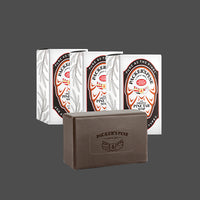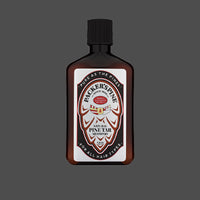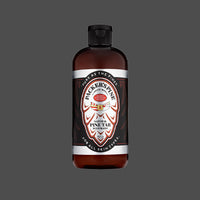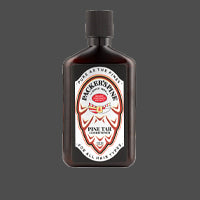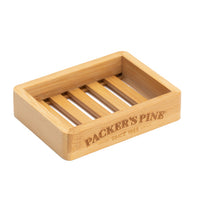Antibacterial Pine Tar Soap
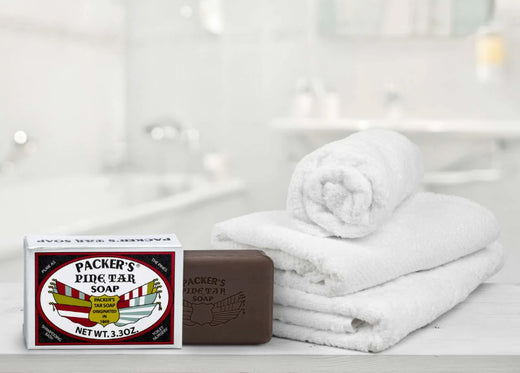
Let’s face it—life is messy. When you think about it, all the fun things in life seem to end in a bath or shower. Outdoor sports. Hiking and camping. Gardening. Going to the gym. Getting dirty on the playground. Playing on the beach. And on, and on, and on. Where there’s dirt, soap usually follows.
We’re literally swimming in options when it comes to soap. Bar soap. Shower gel. Dry shampoo. Shaving soap. Soap with added essential oils. Unscented soap. Antibacterial soap. Hand soap. Face soap. The list seems endless.
So how do you choose the right soap? One factor to consider is the frequency with which you clean your hands and body. You are likely washing your hands multiple times per day: After using the bathroom, before preparing a meal, after preparing a meal, after petting your furry friends, in the bath or shower.
Since you’re going to be applying soap to your skin so frequently, it may be time to put in a little more thought about that little rectangular bar of soap you keep on the sink or in the shower.
Packer’s Pine Tar Soap has many healing and soothing properties that make it an ideal choice for cleaning and protecting your skin. Pine tar soap is antibacterial, antimicrobial, antifungal, and anti-itch. Because it hydrates as well as it cleans, we think once you’ve tried it, you’ll realize this is not your run of the mill antibacterial soap. Let’s find out more about how natural antibacterial pine tar soap differs from the synthetic version.
Is Antibacterial Soap Beneficial for Your Health?
The short answer is: that depends.
You’ve probably heard plenty about antibacterial soap. Marketing soap as “antibacterial” has been in favor for more than 20 years. After all, what could be wrong with soap that fights bacteria,right?
It turns out that synthetic antibacterial soap may do more harm than good. When it comes to synthetic soaps that are labeled “antibacterial,” these products are chemical concoctions that don’t always have a favorable impact on your skin and health.
Triclosan is the most common active ingredient in antibacterial soap. It does destroy bacteria, but it doesn’t stop there. This harsh chemical winds up harming skin in the process, stripping the epidermal layer of vital natural oils and potentially causing dryness and flakiness. Triclosan is widely known to be an endocrine disruptor, meaning that it may interrupt our normal metabolism, potentially negatively affecting multiple body systems. The use of products containing triclosan has been observed to cause skin irritation, asthma, eczema, and allergic reactions.
It gets even worse. Triclosan may be associated with liver cancer, birth defects, and a weakened immune system. You may never look at your mass market antibacterial soap in the same way again.
On top of all of this, there is no evidence whatsoever that triclosan-containing soap does anything to protect you from illness. In fact, it has never been shown to have any added benefits above and beyond the use of regular soap and water.
On the other hand, there are some studies that show that mass market antibacterial soaps may lead to the emergence of antibiotic-resistant strains of bacteria, meaning that their prevalence in our water system could ultimately prove destructive to human health—the exact opposite of their stated purpose.
Natural Antibacterial Pine Tar Soap
This brings us to natural pine tar soap. If you’ve never had a chance to try it, pine tar soap has a woodsy scent that is reminiscent of childhood camping trips and chilly nights in front of the fire. Some people have used pine tar soap for years or even decades, just due to the smell alone.
It may not be widely known, however, that natural pine tar soap also has antibacterial properties. What does this mean for the health of your skin?
Antibacterial pine tar soap has little in common with the expensive chemical-laden mass market antibacterial soaps you’ll find in the supermarket. Pine tar is a completely natural product that has been in use for thousands of years. Pine tar is a result of heating pine wood to extremely high temperatures, which releases a sticky resin that has many qualities that are absent from the wood form. From medicinal uses to application as a wood sealant, the waxy, protective texture of pine tar has a surprising array of benefits to human and animal skin as well.
Pine tar soap is recommended for so many skin conditions that keeping at least one bar on hand at all times is a complete no brainer. Antibacterial pine tar soap is soothing for rashes and insect bites. It purifies conditions such as eczema and psoriasis, preventing open wounds from becoming infiltrated by bacteria. In children, it is also soothing against chicken pox and diaper rash—and any skin condition that causes discomfort and itch. Pine tar shampoo is an excellent remedy for dandruff, considering that it is antifungal as well as antibacterial.
Packer’s Antibacterial Pine Tar Soap
Packer’s Pine makes antibacterial pine tar soap with a proven formula that is intended for every day use. Shampoo, bar soap, and body wash cover a range of uses and are suitable for anyone from babies to grandparents, who may remember the clean scent of pine tar from their youth.
Use pine tar soap whenever and wherever you get dirty. It is a must in your gym bag, golf bag, on camping trips, and for soaking in an itch-relieving bath. It’s vital in the summer when mosquitoes and other pests are driving you crazy, and it’s just as useful in winter, when flaky skin and dry scalp call for a daily rinse with pine tar shampoo.
Naturally antibacterial pine tar soap has none of the dangers associated with triclosan-based detergent soaps. It is gentle, hydrating, and soothing, not irritating. Packer’s Pine tar soap is even gentle enough to be used on delicate facial skin. Would you ever even consider putting hand sanitizer on your face? We didn’t think so!




